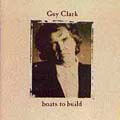
 | |||
| 1. | Baton Rouge (2:49) | 6. | Ramblin’ Jack and Mahan (3:53) |
| 2. | Picasso’s Mandolin (2:56) | 7. | I Don’t Love You Much Do I (2:41) |
| 3. | How’d You Get This Number (3:36) | 8. | Jack of All Trades (3:41) |
| 4. | Boats to Build (3:49) | 9. | Madonna w/Child ca. 1969 (3:01) |
| 5. | Too Much (2:55) | 10. | Must Be My Baby (2:54) |